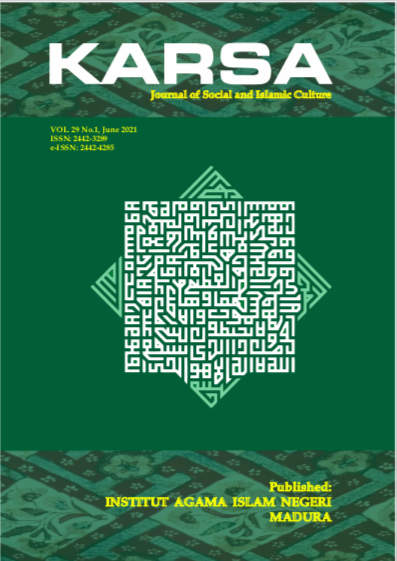Commodification Practices in the Begawe Sasak’s Lombok Tradition
 Abstract views: 552
,
Abstract views: 552
,
 PDF downloads: 586
PDF downloads: 586
Abstract
The begawe tradition, which has become the popular culture of Sasaknese, has begun shifted by the consumption of mass cultures, such as catering services, the use of tools or begawe needs, starting to be replaced by industrial products for rent or sale. The forms of commodification in the begawe tradition, especially in begibung (eating together) and betulung (helping each other), two things that become the ‘aura’ of begawe. This difference can be seen from the shifting values, from the principle of kinship to individualism; of various equipment that is transformed and then commercialized. The new ethnography in this case study becomes the basis for examining the commodification practice in the begawe tradition, which switches to catering services and traditional equipment and replaces by modern equipment. The author, who is part of the Sasak community, also takes a participatory approach in begawe events held by the community. This shows that the alienation of popular culture in society cannot be contained by massive mass culture, so that people, which were initially established with high social values, began to form individualist societies that competed to show their social status. The consumption of signs/symbols has formed a society trapped in a pseudo-need that is unwittingly oppressive. Awareness to be critical and filter the mass culture needs a sphere for negotiation to return the spirit of the social community based on kinship interaction.
Downloads
References
Adorno, Theodor W., and Max Horkheimer. The Dialectic of Enlighten-ment. London: Verso, 1979.
Adorno, Theodor W., and J. M. Bernstein. The Culture Industry. New York: Routledge, 2001.
Agger, Ben. Teori Sosial Kritis. Yogyakarta: Kreasi Wacana, 2014.
Barker, Chris. Cultural Studies: Teori dan Praktik. Yogyakarta: Kreasi Wacana, 2004.
Barker, Chris. The Sage Dictionary of Cultural Studies. London: Sage Publications, 2003.
Baudrillard, Jean. Masyarakat Konsumsi. Yogyakarta: Kreasi Wacana, 2004.
Baudrillard, Jean. Simulacra and Simulations. New York: Semiotext, 1983.
Benjamin, Walter. Work of Art in the Age of Its Technological Reprodu-cibility, and Other Writings on Media. Massachusetts: Harvard University Press: 2008.
Brewer, Anthony. Kajian Kritis Das Kapital Karl Marx. Yogyakarta: Narasi Pustaka, 2016.
Fiske, John. Memahami Budaya Populer. Yogyakarta: Jalasutra, 2011.
Habermas, Jürgen. Teori Tindakan Komunikatif I: Rasio dan Rasionalisasi Masyarakat. Translated by Alimandan. Yogya-karta: Kreasi Wacana, 2007.
Habermas, Jürgen. The Philosophical Discourse of Modernity. Cambridge: Polity Press, 1987.
Hasan, Sandi Suwardi. Pengantar Cultural Studies: Sejarah, Pendekatan Konseptual, dan Isu Menuju Studi Budaya Kapital-isme Lanjut. Yogyakarta: Ar-Ruz Media, 2011.
Kumbara, A.A. Ngr Anom. “Konstruksi Identitas Orang Sasak di Lombok Timur NTB.” Humaniora 20, no. 3 (2008): 315-326. https://doi.org/10.22146/jh.947.
Malla, Hamlan Andi Baso, Khaeruddin Yusuf, and Nur Rohim Yunus, “Indigenous Monikah Tajio Ethnic of Islamic Cultural Heritage at Kasimbar, Central Sulawesi.” Karsa: Journal of Social and Islamic Culture 28, no. 2 (2020): 363-389. https://doi.org/10. 19105/karsa.v28i2.3301.
Nye, Joseph S. Soft Power: The Means to Success in World Politics. New York: PublicAffairs, 2004.
Paok, Valentina Tutu. “Komodifikasi dalam Program Pengembangan Seni Budaya di Jogja TV.” Tesis, Fakultas Ilmu Sosial dan Ilmu Politik, Universitas Atma Jaya Yogyakarta, 2012.
Rahim, Abdul and Wisma Nugraha Christianto. “Negosiasi Atas Adat dalam Sistem Pelaksanaan Tradisi Nyongkolan Sasak Lombok.” Jurnal Kawistara 9, no. 1 (2019): 28-44. https://doi.org/10.22146/ kawistara.36125.
Saukko, Paula. Doing Research in Cultural Studies: An Introduction to Classical and New Methodological Approaches. London: Sage Publications, 2003.
Soekiman, Djoko. Kebudayaan Indis: dan Gaya Hidup Masyarakat Pendukungnya di Jawa Abad XVIII-Medio Abad XX. Yogyakarta: Bentang Pustaka, 2000.
Soetomo, Greg. Krisis Seni Krisis Kebudayaan. Yogyakarta: Pustaka Filsafat, 2003.
Storey, John. Cultural Studies dan Kajian Budaya Pop. Yogyakarta: Jalasutra, 2007.
Strinarti, Dominic. Popular Culture: Pengantar Menuju Teori Budaya Populer. Yogyakarta: Ruzz Media, 2009.
Sumadi, I Wayan Suca, I Gusti Ngurah Jayanti, and Anak Agung Rai Geria. Tradisi Nyongkolan dan Eksistensinya di Pulau Lombok. Yogyakarta: Penerbit Ombak, 2013.
Wacana, Lalu. Pulau Lombok dalam Sejarah Ditinjau dari Aspek Budaya. Jakarta: Depdikbud, 1987.
Yanti, Fitri, Eni Amaliah, and Abdul Rahman “Ngababali Tradition on Islamic Religious Practice in The Negeri Besar Village, Way Kanan, Lampung Province.” Karsa: Journal of Social and Islamic Culture 26, no. 2 (2018): 306-326. https://doi.org/10.19105/karsa. v26i2.2043.
Zafi, Ashif Az. “Transformasi Budaya Melalui Lembaga Pendidikan (Pembudayaan dalam Pembentukan Karakter).” SOSIOHUMA-NIORA: Jurnal Ilmiah Ilmu Sosial dan Humaniora 3, no. 2 (2017): 105-112. https://doi.org/10.30738/sosio.v3i2.937.
The journal operates an Open Access policy under a Creative Commons Non-Commercial Share-Alike license. Authors who publish with this journal agree to the following terms:
- Authors retain copyright and grant the journal right of first publication with the work simultaneously licensed under a Creative Commons Attribution License that allows others to share the work with an acknowledgement of the work's authorship and initial publication in this journal.
- Authors are able to enter into separate, additional contractual arrangements for the non-exclusive distribution of the journal's published version of the work (e.g., post it to an institutional repository or publish it in a book), with an acknowledgement of its initial publication in this journal.
- Authors are permitted and encouraged to post their work online (e.g., in institutional repositories or on their website) prior to and during the submission process, as it can lead to productive exchanges, as well as earlier and greater citation of published work.



















